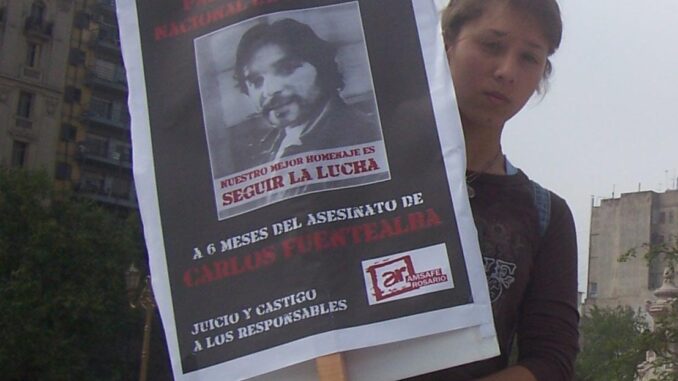
Dateline: Monday, April 9th. 2007, Buenos Aires, Argentina,
Updated: Wednesday May 16th. 2007, Buenos Aires, Argentina.
Back in April the furious reaction of the teachers and left wing groups were impressive. Supporting the teachers were the two top unions in the country, many political groups and the “Piqueteros duros”, tough young men and women (many unemployed) who obscure their faces with scarves. Similar marches and reactions were seen across the country. The protests continued in the province of Neuquen for two months until the 28th of April when the teachers finally reached an agreement on salary.
Carlos Fuentealba, the deceased 41-year-old teacher and left wing activist, was reticent to go out to protest that day. He confessed same to a friend that same morning before he made the fatal decided to proceed to the road blockage where he was to die, shot by a sadistic provincial policeman. The policeman fired the tear gas canister at point blank range at Carlos’ head while the teacher sat in a car, a Fiat 147. The same policeman was recently sentenced to two years in jail for torturing a prisoner in jail but was never incarcerated for that crime.
Neuquen, the Argentine Southwestern Patagonian province famous to tourists for the lake district and Bariloche ski resorts, remains in the hands of the right-wing hard-liner Jorge Sobisch. Governor Sobisch is politically aligned with powerful politician Mauricio Macri, although Macri dissociated himself from the Neuquen governor. Macri in turn is facing stiff competition in the mayoral race for the Argentine Federal Capital, Buenos Aires (number two political job in the country) from the current mayor Telermann and Kirchner backed, Filmus.
Mr. Macriin turn is heir to an industrial fortune, which grew from seven to forty seven companies during the notorious ?76-?83 dictatorship.
The situation in Neuquen is relatively calm. Sobisch belatedly offered the teachers their money. The teachers initially refused, continuing to push for his renunciation. Sobisch came out with a statement that he regretted the death of the teacher and the death of two federal policemen in Buenos Aires. The two incidents were entirely unrelated as the policemen we shot in a robbery by thieves more than 1000Km away in an unrelated incident but it is indicative of the governor’s blindness to his complicity. Sobisch even fired a few minor members of his government in an effort to appease the teachers but that reaction was not interpreted as adequate. He then sent his own government officials to open schools and escort groups of women to “protest” at their continued closure, this backfired as most press outlets noted their presence in their articles thereby nullifying the propaganda effect of the staged protests. Finally Sobisch tried to open the schools using scab teachers but that failed too. The current latin American edition of the international political magazine, Le Monde doiplomatique, came out with a photo of a protest march with a poster of Fuentealba on the front page.
The province having been described by some commentators as being in a state of revolution, however subdued. The parallels with Oaxaca of last year are hardly coincidental. Governor Sobisch should have stood down but this seems increasingly unlikely unless he puts his foot in it again. The national government refused to take a stand. It seems he will remain in power until the next elections but it seems unlikely his bid for presidency will go much further.

Tough stuff Tony, three hundred dollars a month eh? Amazingly low salaries for professionals.